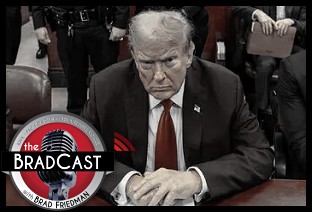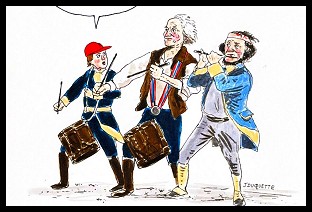 Ohio Secretary of State Jennifer Brunner issued a short, unambiguous and to-the-point directive [PDF] last night, to all 56 counties in Ohio still employing unverifiable Direct Recording Electronic (DRE, usually touch-screen) voting machines, that they must make a paper ballot available at the polling place to any voter who wishes to vote on one.
Ohio Secretary of State Jennifer Brunner issued a short, unambiguous and to-the-point directive [PDF] last night, to all 56 counties in Ohio still employing unverifiable Direct Recording Electronic (DRE, usually touch-screen) voting machines, that they must make a paper ballot available at the polling place to any voter who wishes to vote on one.
Brava!
Her directive even goes so far as to require those paper ballots actually be counted "on election night as part of the unofficial canvass."
Brava again! The requirement to actually count those paper ballots before unofficial results are release to the public and media is a key component that has been missing from the various federal legislative efforts, including Rep. Rush Holt's (D-NJ) latest bill as currently drafted, as well as his previous one (HR811), that would begin to put paper back into the polling place.
Every state in the country should follow suit! As well, we recommend that, at the very least, Brunner issue a further directive that signs shall be conspicuously and clearly posted in each polling place to inform voters of their right to vote on paper, if they wish. Better still, a directive that requires every voter to be asked by voting officials, before they vote, if they wish to vote on paper. We have previously recommended such a "paper or plastic?" requirement for any jurisdiction in America that still allows for the use of horrible DRE systems (including those with or without a useless, so-called "paper trail").
Until then, Democracy advocates in the Buckeye state will need to launch an important, and potentially expensive (but crucial), education campaign to inform voters of their right to vote on paper!
With the very good general news from Brunner, let's hope she soon realizes the underlying reasons for serious concerns about, and the great dangers of, not counting and posting precinct voting results at the precinct, before they are sent back to county headquarters for central tabulation.
Brunner's recent independent testing of Ohio's e-voting systems (known as EVEREST) led her to recommend the abolishment of all DRE systems in the state, although she did not issue a binding directive to that end. At the same time, her recommendation to ban precinct-based counting, in favor of central-based counting, has drawn a great deal of criticism from Election Integrity advocates. Rightly so, in our opinion, even if she came to her recommendation through well-meaning advice from some of the folks who advised on the study, including computer security experts, and election officials of the sort who would be inappropriately entrusted with complete control over that dangerously centralized counting process.
(You can read our direct challenges to Brunner on that point, and her explanations for the decision, in our recent exclusive interview with her, just after the release of EVEREST.)
One quick note to Mark Niquette and Columbus Dispatch concerning their coverage of this issue in this morning's paper...
 The anti-democracy advocate, otherwise known as Matthew Damschroder, director of the Franklin County Board of Elections and president of the Ohio Association of Election Officials, is quoted in Niquette's Dispatch story, for supposed "balance" in the article. Damshroder is characterized as opposing Brunner's new paper ballot requirement although his county --- like every other county in Ohio --- already uses such paper ballots for absentee and provisional voters. He claims, however, that there is not enough time before the March primaries to implement Brunner's directive requiring sufficient paper ballots be printed and made available at the polling lace for anybody who wishes one.
The anti-democracy advocate, otherwise known as Matthew Damschroder, director of the Franklin County Board of Elections and president of the Ohio Association of Election Officials, is quoted in Niquette's Dispatch story, for supposed "balance" in the article. Damshroder is characterized as opposing Brunner's new paper ballot requirement although his county --- like every other county in Ohio --- already uses such paper ballots for absentee and provisional voters. He claims, however, that there is not enough time before the March primaries to implement Brunner's directive requiring sufficient paper ballots be printed and made available at the polling lace for anybody who wishes one.
While we disagree with Damshroder's point, it's fair enough to include it. But balance should similarly be offered by any reporter using the voting machine company-friendly, Republican Damschroder as a source, by informing readers that he inappropriately accepted a $10,000 "donation" from a Diebold lobbyist on behalf of the Ohio Republican party just days before the 2004 Presidential Election. That wholly inappropriate behavior by an election official earned him a 30-day suspension without pay. Though it was little more than slap on the wrist, given his actions, it's notable that the punishment was issued by the previous, crooked Republican administration.
When reporting on voting machine-related issues, such clear conflicts of interests should properly be noted by any media outlet who uses Damschroder as a source on these matters. Better yet, find a legitimate source --- who hasn't broken the law --- to quote instead.


 Sunday 'Close Enough' Toons
Sunday 'Close Enough' Toons A Pretty Weak 'Strongman': 'BradCast' 10/30/25
A Pretty Weak 'Strongman': 'BradCast' 10/30/25 'Green News Report' 10/30/25
'Green News Report' 10/30/25
 Proposal for 'First Politically Viable Wealth Tax' Takes Shape in CA: 'BradCast' 10/29/25
Proposal for 'First Politically Viable Wealth Tax' Takes Shape in CA: 'BradCast' 10/29/25 Monster Storm, Endless Wars, Gamed Elections:
Monster Storm, Endless Wars, Gamed Elections: 'Green News Report' 10/28/25
'Green News Report' 10/28/25 Let's Play 'Who Wants
Let's Play 'Who Wants Sunday 'Cartoonists Dilemma' Toons
Sunday 'Cartoonists Dilemma' Toons Exiled NOAA Scientists Resurrect Critical Disaster Database: 'BradCast' 10/23/25
Exiled NOAA Scientists Resurrect Critical Disaster Database: 'BradCast' 10/23/25  'Green News Report' 10/23/25
'Green News Report' 10/23/25 Trump-Allied GOP Partisan Buys Dominion Voting Systems: 'BradCast' 10/22/25
Trump-Allied GOP Partisan Buys Dominion Voting Systems: 'BradCast' 10/22/25 Trump, Republican Law(lessness) & (Dis)Order: 'BradCast' 10/21/25
Trump, Republican Law(lessness) & (Dis)Order: 'BradCast' 10/21/25 'Green News Report' 10/21/25
'Green News Report' 10/21/25 Celebrating 'No Kings': 'BradCast' 10/20/25
Celebrating 'No Kings': 'BradCast' 10/20/25 Sunday 'How It Started' Toons
Sunday 'How It Started' Toons SCOTUS Repubs Appear Ready to Gut Rest of Voting Rights Act: 'BradCast' 10/16/25
SCOTUS Repubs Appear Ready to Gut Rest of Voting Rights Act: 'BradCast' 10/16/25 'Green News Report' 10/16/25
'Green News Report' 10/16/25 The 'Epstein Shutdown' and Other Autocratic Nightmares: 'BradCast' 10/15/25
The 'Epstein Shutdown' and Other Autocratic Nightmares: 'BradCast' 10/15/25 Group Vows to Block MO's GOP U.S. House Gerrymander: 'BradCast' 10/14/25
Group Vows to Block MO's GOP U.S. House Gerrymander: 'BradCast' 10/14/25 Trump Labor Dept. Warns Trump Policies Sparking Food Crisis: 'BradCast' 10/9/25
Trump Labor Dept. Warns Trump Policies Sparking Food Crisis: 'BradCast' 10/9/25 Trump's Losing Battles: 'BradCast' 10/8/25
Trump's Losing Battles: 'BradCast' 10/8/25 Trump, Roberts and His Stacked, Packed and Captured SCOTUS: 'BradCast' 10/7/25
Trump, Roberts and His Stacked, Packed and Captured SCOTUS: 'BradCast' 10/7/25 Trump Attempting His 'Invasion from Within': 'BradCast' 10/6/25
Trump Attempting His 'Invasion from Within': 'BradCast' 10/6/25 Biden Budget Expert: Mass Firings in Shutdown 'Illegal': 'BradCast' 10/2/25
Biden Budget Expert: Mass Firings in Shutdown 'Illegal': 'BradCast' 10/2/25 Why is DOJ Suing 'Blue' States for Their Voter Databases?: 'BradCast' 10/1/25
Why is DOJ Suing 'Blue' States for Their Voter Databases?: 'BradCast' 10/1/25
 VA GOP VOTER REG FRAUDSTER OFF HOOK
VA GOP VOTER REG FRAUDSTER OFF HOOK Criminal GOP Voter Registration Fraud Probe Expanding in VA
Criminal GOP Voter Registration Fraud Probe Expanding in VA DOJ PROBE SOUGHT AFTER VA ARREST
DOJ PROBE SOUGHT AFTER VA ARREST Arrest in VA: GOP Voter Reg Scandal Widens
Arrest in VA: GOP Voter Reg Scandal Widens ALL TOGETHER: ROVE, SPROUL, KOCHS, RNC
ALL TOGETHER: ROVE, SPROUL, KOCHS, RNC LATimes: RNC's 'Fired' Sproul Working for Repubs in 'as Many as 30 States'
LATimes: RNC's 'Fired' Sproul Working for Repubs in 'as Many as 30 States' 'Fired' Sproul Group 'Cloned', Still Working for Republicans in At Least 10 States
'Fired' Sproul Group 'Cloned', Still Working for Republicans in At Least 10 States FINALLY: FOX ON GOP REG FRAUD SCANDAL
FINALLY: FOX ON GOP REG FRAUD SCANDAL COLORADO FOLLOWS FLORIDA WITH GOP CRIMINAL INVESTIGATION
COLORADO FOLLOWS FLORIDA WITH GOP CRIMINAL INVESTIGATION CRIMINAL PROBE LAUNCHED INTO GOP VOTER REGISTRATION FRAUD SCANDAL IN FL
CRIMINAL PROBE LAUNCHED INTO GOP VOTER REGISTRATION FRAUD SCANDAL IN FL Brad Breaks PA Photo ID & GOP Registration Fraud Scandal News on Hartmann TV
Brad Breaks PA Photo ID & GOP Registration Fraud Scandal News on Hartmann TV  CAUGHT ON TAPE: COORDINATED NATIONWIDE GOP VOTER REG SCAM
CAUGHT ON TAPE: COORDINATED NATIONWIDE GOP VOTER REG SCAM CRIMINAL ELECTION FRAUD COMPLAINT FILED AGAINST GOP 'FRAUD' FIRM
CRIMINAL ELECTION FRAUD COMPLAINT FILED AGAINST GOP 'FRAUD' FIRM RICK SCOTT GETS ROLLED IN GOP REGISTRATION FRAUD SCANDAL
RICK SCOTT GETS ROLLED IN GOP REGISTRATION FRAUD SCANDAL VIDEO: Brad Breaks GOP Reg Fraud Scandal on Hartmann TV
VIDEO: Brad Breaks GOP Reg Fraud Scandal on Hartmann TV RNC FIRES NATIONAL VOTER REGISTRATION FIRM FOR FRAUD
RNC FIRES NATIONAL VOTER REGISTRATION FIRM FOR FRAUD EXCLUSIVE: Intvw w/ FL Official Who First Discovered GOP Reg Fraud
EXCLUSIVE: Intvw w/ FL Official Who First Discovered GOP Reg Fraud GOP REGISTRATION FRAUD FOUND IN FL
GOP REGISTRATION FRAUD FOUND IN FL

































